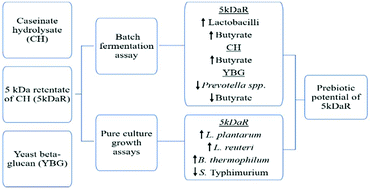Evaluation of the in vitro effects of the increasing inclusion levels of yeast β-glucan, a casein hydrolysate and its 5 kDa retentate on selected bacterial populations and strains commonly found in the gastrointestinal tract of pigs†
Abstract
Previously, the 5 kDa retentate (5kDaR) of a casein hydrolysate (CH) and yeast β-glucan (YBG) were identified as promising anti-inflammatory dietary supplements for supporting intestinal health in pigs post-weaning. However, their direct effects on intestinal bacterial populations are less well-known. The main objectives of this study were to determine if the increasing concentrations of the CH, 5kDaR and YBG individually, can: (1) alter the bacterial and short-chain fatty acid profiles in a weaned pig faecal batch fermentation assay, and (2) directly influence the growth of selected beneficial (Lactobacillus plantarum, L. reuteri, Bifidobacterium thermophilum) and pathogenic (Enterotoxigenic Escherichia coli, Salmonella Typhimurium) bacterial strains in individual pure culture growth assays. The potential of CH as a comparable 5kDaR substitute was also evaluated. The 5kDaR increased lactobacilli counts and butyrate concentration in the batch fermentation assay (P < 0.05) and increased L. plantarum (linear, P < 0.05), L. reuteri (quadratic, P < 0.05) and B. thermophilum (linear, P < 0.05) counts and reduced S. typhimurium (quadratic, P = 0.058) counts in the pure culture growth assays. CH increased butyrate concentration (P < 0.05) in the batch fermentation assay. YBG reduced Prevotella spp. counts (P < 0.05) and butyrate concentration (P < 0.05) in the batch fermentation assay. Both CH and YBG had no major effects in the pure culture growth assays. In conclusion, the 5kDaR had the most beneficial effects associated with increased counts of Lactobacillus and Bifidobacterium genera and butyrate production and reduced S. typhimurium counts in vitro indicating its potential to promote gastrointestinal health.



 Please wait while we load your content...
Please wait while we load your content...